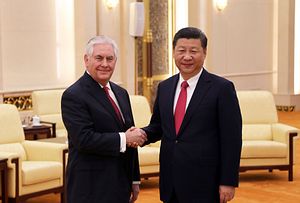Much has been written about the key questions of the 21st century; first, can the liberal international order survive the rise of China, and second, how will the rise of China revise the extant international order? This is the first of a multi-part series designed to establish a frame for how to think about these questions; how we got here, and how to proceed in light of undeniable structural realities.
To begin, it’s worth considering why the United States was slow to note the rise of Chinese power. U.S. policymakers worried a great deal about the expansion of Chinese economic and military power in the 1950s and 1960s, but less so in the 1970s and 1980s. The best answers to why the United States stepped back from steps intended to check China’s rise run as follows. First, the rise of China was advantageous in geopolitical competition against the Soviet Union. Second, the development of the Chinese economy worked to the advantage of both U.S. businesses and U.S. consumers, although not to all labor sectors. Third, U.S. policymakers were optimistic that China would reform politically as it reformed economically, thus removing it as an international threat. Of these, the first was true, but became irrelevant in 1991; the second largely remains true, as the U.S.-China trade axis has underwritten global economic growth since the 1980s; the third has not been realized in any meaningful way.
What could the United States have done to prevent the rise of China? U.S. policymakers perceived the likelihood of competition with the Soviet Union in the waning days of World War II, and officially acknowledged the hostility of the relationship by the late 1940s. This resulted in efforts to contain the USSR geographically, limit its access to military technology, and limit its access to the emerging global trade and financial regimes. The USSR itself was happy to abet the third, as it preferred to establish its own set of regulatory regimes. Together, these policies resulted in a growing economic and technological divide between the USSR and the US, which by the 1980s became fatal for Soviet global ambitions.
Things were different with China. As noted, U.S. policymakers were slow to acknowledge the reality of China’s economic growth, and have yet to agree that the relationship is necessarily adversarial. The U.S. had taken steps in the 1970s and 1980s to increase Chinese economic and military power, through technology transfer, investment, and the facilitation of China’s entry into the global economy. When the Soviet Union collapsed, the U.S. could conceivably have turned the proverbial ship around, and engaged in the active military and economic containment of China. This would have required the imposition of stiff restrictions on investment, harsh export controls on dual use technologies, and militarized containment designed to reduce China’s global influence. Such steps would have been a hard sell for U.S. allies, most of whom had a strong interest in access to the Chinese market. But it also would have been a hard sell in the US, as such steps would have imposed heavy costs on U.S. consumers (although some labor sectors would have benefited), and U.S. capital. Such a policy of containment would also have forestalled any hope of China’s peaceful, productive integration into the liberal international order, not to mention condemning vast numbers of Chinese citizens to poverty and isolation.
The United States did not undertake the difficult and expensive steps necessary to prevent the economic and military rise of China. It might have failed even if it had attempted such an effort, but the cat is now out of the bag. The next post distills some of the extant arguments about the impact of the rise China on the liberal international order.

































